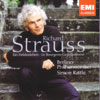Strauss (Ein) Heldenleben
Rattle rises to the challenge set by Karajan in Berlin
View record and artist detailsRecord and Artist Details
Composer or Director: Richard Strauss
Genre:
Orchestral
Label: EMI Classics
Magazine Review Date: 5/2006
Media Format: CD or Download
Media Runtime: 82
Mastering:
Stereo
DDD
Catalogue Number: 339339-2

Tracks:
| Composition | Artist Credit |
|---|---|
| (Le) Bourgeois gentilhomme |
Richard Strauss, Composer
Berlin Philharmonic Orchestra Richard Strauss, Composer Simon Rattle, Conductor |
| (Ein) Heldenleben, '(A) Hero's Life' |
Richard Strauss, Composer
Berlin Philharmonic Orchestra Guy Braunstein, Violin Richard Strauss, Composer Simon Rattle, Conductor |
Author: Edward Greenfield
Ein Heldenleben was always a favourite party-piece of Herbert von Karajan, so the challenge to his successor, Simon Rattle, is all the more formidable. It says much for Rattle’s achievement in Berlin that the result in this live recording offers the keenest rivalry for either of the outstanding versions I list. The heroic opening section already establishes Rattle’s approach as a degree more flexible, more warmly expressive than Karajan’s. Karajan is certainly warm, but he generally keeps his expressiveness within steady speeds, where Rattle is a degree freer, with rhythms subtly pointed.
Typically, he treats the violinist, Guy Braunstein, as a genuine soloist, encouraging him to play with the sort of expressive freedom one expects in a concerto, while the equally brilliant Michel Schwalbe for Karajan tends to stay within the set tempo even in the most elaborate sections of the long solo representing the composer’s wife. Braunstein is the more individual, and so are the various wind soloists in the piece, including those in the second section representing the composer’s enemies, the critics.
What remains a constant is the opulence of the Berlin Philharmonic sound. The 1974 EMI recording of the Karajan version remains impressive for its time but the modern digital recording is far richer still, starting with the most resonant E flat in the bass at the very start and covering a formidable dynamic range, bringing out the subtlety of Rattle’s control and the refinement of the orchestra’s playing. The fine Kempe version dates from rather earlier than Karajan’s and, quite apart from the less wide-ranging recording, his is a less forceful, rather more relaxed reading than either Rattle’s or Karajan’s. In his overall timing Rattle takes a couple of minutes longer than either, with the extra breadth due at least in part to the expressive freedom encouraged in a live performance, something that clearly adds to the magnetism of the finished recording.
The fill-up is a generous one, bringing the overall timing of the disc to an exceptional 82 minutes. The engineers, though working in the Philharmonie as in Heldenleben, have rightly balanced the microphones to give a much more intimate result with the chamber ensemble of Le bourgeois gentilhomme. This time Rattle’s performance is more relaxed than Kempe’s, with speeds rather broader, making for a performance that delightfully captures the light-heartedness of this music, with delectable rhythmic pointing in the 18th-century pastiche.
Typically, he treats the violinist, Guy Braunstein, as a genuine soloist, encouraging him to play with the sort of expressive freedom one expects in a concerto, while the equally brilliant Michel Schwalbe for Karajan tends to stay within the set tempo even in the most elaborate sections of the long solo representing the composer’s wife. Braunstein is the more individual, and so are the various wind soloists in the piece, including those in the second section representing the composer’s enemies, the critics.
What remains a constant is the opulence of the Berlin Philharmonic sound. The 1974 EMI recording of the Karajan version remains impressive for its time but the modern digital recording is far richer still, starting with the most resonant E flat in the bass at the very start and covering a formidable dynamic range, bringing out the subtlety of Rattle’s control and the refinement of the orchestra’s playing. The fine Kempe version dates from rather earlier than Karajan’s and, quite apart from the less wide-ranging recording, his is a less forceful, rather more relaxed reading than either Rattle’s or Karajan’s. In his overall timing Rattle takes a couple of minutes longer than either, with the extra breadth due at least in part to the expressive freedom encouraged in a live performance, something that clearly adds to the magnetism of the finished recording.
The fill-up is a generous one, bringing the overall timing of the disc to an exceptional 82 minutes. The engineers, though working in the Philharmonie as in Heldenleben, have rightly balanced the microphones to give a much more intimate result with the chamber ensemble of Le bourgeois gentilhomme. This time Rattle’s performance is more relaxed than Kempe’s, with speeds rather broader, making for a performance that delightfully captures the light-heartedness of this music, with delectable rhythmic pointing in the 18th-century pastiche.
Discover the world's largest classical music catalogue with Presto Music.

Gramophone Digital Club
- Digital Edition
- Digital Archive
- Reviews Database
- Full website access
From £8.75 / month
Subscribe
Gramophone Full Club
- Print Edition
- Digital Edition
- Digital Archive
- Reviews Database
- Full website access
From £11.00 / month
Subscribe
If you are a library, university or other organisation that would be interested in an institutional subscription to Gramophone please click here for further information.




